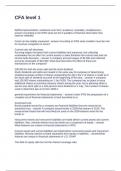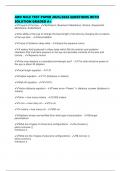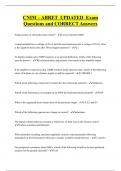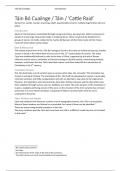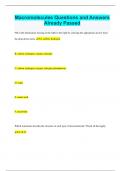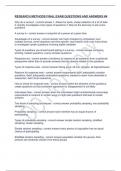Politics, Media, and Communication
Week 1
Readings
Barberá et al. – Introduction
Introduction
- There is a widespread concern that social media may be undermining democracy
- Aim: comprehensive overview on the factors that may be undermining the
quality of democracy
o Social media usage
o Political polarization
o Prevalence of disinformation online
Disinformation = the category describing the types of information
that one could encounter online that could result in
misinterpretations about the actual state of the world
Social media and Political Participation
- Social media is considered as a way of increasing political participation
o Exposure to disinformation may help mobilize supporters and
demobilize opponents
o This could affect democratic quality through impacts on political
engagement
- Social media itself is neither inherently democratic or undemocratic
o An arena in which political actors can contest for power and influence
- Purpose of the report
o Summarize research
o Understand the relationship between social media, political participation,
disinformation, and democratic quality
o Identify important data needs
- Research gaps:
o Better estimates of the effects of exposure to information and
disinformation online
o Cross- and multi-platform research
o Disinformation spread through images and video
o Generalizability and comparability of US findings
o The role of ideological asymmetries in mediating the effects of
disinformation and polarization
o The effects of new laws and regulations regarding limits on the spread of
disinformation
o Better understanding of the strengths and weaknesses of different
methods of bot detection
o The role of political elites in spreading disinformation
, Deibert – The Road to Digital Unfreedom: Three Painful Truths About Social Media
Summary
- The article itemizes the problems surrounding social media and political
authority in the form of three painful truths
1. Social media business is built around personal data surveillance,
designed to spy on us to push advertising in our direction
2. We have consented to this, but not fully wittingly. Social media are
designed as addiction machines, programmed to draw upon our
emotions.
3. Attention-grabbing algorithms propel authoritarian practices, by
facilitating manipulation and undermining accountability. Fine-
grained surveillance that companies perform is a valuable proxy for
authoritarian control.
- Studies have shown that nation-states and non-state actors have abused social
media as a tool of their information operations
Social Media Equal Surveillance Capitalism
- Surveillance capitalism = consumers get services while industries monitor users’
behavior in order to tailor advertisements to them
We Consent (but not wittingly)
- Knowledge of social media’s unintended consequences is spreading
o But social media as a whole remain popular
Surveillance-based economic system is constantly expanding
- The pervasiveness of social media creates strong incentives/disincentives
favoring participation in these services
- Infrastructural imperialism = organizations offer social media as the easiest way
to access their services, subtly shaping the choices of those who opt in
- Social media stimulate us in a subconscious and hormonal way
Social Media Drive Authoritarian Practices
- Not only is social media compatible with authoritarianism, they may be one of
the reasons why it is spreading worldwide
o Authoritarian practices aim to control people and promote confusion,
ignorance, prejudice, and chaos in order to undermine public
accountability
- Social media is more conducive to extreme, emotionally charged and divisive
types of content
- Social media companies are unwilling or unable to weed out malicious or false
information
- Algorithm-driven advertising pushes extreme, inaccurate and radical content
A tool for Authoritarians
- Authoritarianism thrives by taking advantage of social media’s inherent
insecurity
o Tactics range from phishing and social engineering campaigns to the use
of sophisticated spyware to infect a target’s devices
, - Thanks to social media, autocrats can now reach across borders, with perilous
consequences
Can Social Media Be De-Toxified?
- To restore liberal democracy, we will need a change in our way of life
- We must learn to treat our information environment in the same way as our
natural environment
o As something over which we protect and behave in a spirit of caution
and restraint
Barberá et al. – Tweeting From Left to Right: Is Online Political Communication More
Than an Echo Chamber?
Summary
- Study on whether online communication resembles an echo chamber (as a result
of selective exposure) or a national conversation
- Political issues: information was exchanged primarily among individuals with
similar ideological preferences
o But not many current events
- Cases of national conversations turning into a polarized exchange
- Liberals were more likely to engage in cross-sectional dissemination
o Consistent with psychological theory and research on ideological
differences in existential and relational motivation
Introduction
- Greater access to information can lead to selective exposure, resulting in echo
chamber environments
o These environments can facilitate social extremism and political
polarization
Design and Approach
- Method that generates estimates of ideological positions of extremely large
numbers of social media users
- Built on the idea that decisions on whom to follow on platforms can reflect an
individual’s political preferences
- Expectations:
o Higher levels of ideological segregation on twitter related to political
issues versus other types of current events
- Analyzed big data sources to know:
o The extent to which media environments can resemble echo chambers
o Whether liberals and conservatives behave similarly in their use of social
media when it comes to sharing information about politics and current
events
- If individuals are embedded in homogenous networks in regards to
sociodemographic and behavioral characteristics, their connections are
indications of similarity
- Results: Distance in the latent ideological space is predictive of the decisions
users made about whom to follow
, Results
- Focused on retweeting
o Three different metrics of polarization
The percentage of retweets that occurred amongst individuals
with similar ideologies
The degree of ideological homogeneity in communities of users
within retweets
The average ideological extremity spread via retweets
- Political issues
o Retweets mainly occurred within ideological groups
o Minim wage, government shutdown = highly polarized
o Liberals were more likely to engage in cross-ideological retweeting
- Non-political topics
o Were not bound to ideological boundaries
Except at the far right in some cases
o Have the capacity to stimulate discussions among individuals with
different ideologies
o Do not strictly conform ot the image of an echo chamber
o Liberals and conservatives interacted with each other
Cinelli et al. – The echo chamber effect on social media
Summary
- Study on the key differences between the main social media platforms and how
they are likely to influence information spreading and echo chamber formation
- Comparative analysis of over 100 pieces of content from Twitter, Facebook,
Reddit and Gab
- Echo chambers quantified by
o Homophily in the interaction networks
o Bias in the information diffusion
- Results: The grouping of users in homophilic clusters is most present on
interactions on Facebook and Twitter
o The two platforms organized around social networks and news feed
algorithms
Analysis
- One dataset for each social media
o Twitter: Abortion
o Facebook: Vaccines
o Reddit: Politics
o Gab as a whole
- A network’s topology can reveal echo chambers
o Similar leanings result in similar contents
- The presence of homophilic interactions can be confirmed by the structure of
information networks
o Facebook and Twitter: communities span the whole spectrum, but users
with similar leanings form each community
Week 1
Readings
Barberá et al. – Introduction
Introduction
- There is a widespread concern that social media may be undermining democracy
- Aim: comprehensive overview on the factors that may be undermining the
quality of democracy
o Social media usage
o Political polarization
o Prevalence of disinformation online
Disinformation = the category describing the types of information
that one could encounter online that could result in
misinterpretations about the actual state of the world
Social media and Political Participation
- Social media is considered as a way of increasing political participation
o Exposure to disinformation may help mobilize supporters and
demobilize opponents
o This could affect democratic quality through impacts on political
engagement
- Social media itself is neither inherently democratic or undemocratic
o An arena in which political actors can contest for power and influence
- Purpose of the report
o Summarize research
o Understand the relationship between social media, political participation,
disinformation, and democratic quality
o Identify important data needs
- Research gaps:
o Better estimates of the effects of exposure to information and
disinformation online
o Cross- and multi-platform research
o Disinformation spread through images and video
o Generalizability and comparability of US findings
o The role of ideological asymmetries in mediating the effects of
disinformation and polarization
o The effects of new laws and regulations regarding limits on the spread of
disinformation
o Better understanding of the strengths and weaknesses of different
methods of bot detection
o The role of political elites in spreading disinformation
, Deibert – The Road to Digital Unfreedom: Three Painful Truths About Social Media
Summary
- The article itemizes the problems surrounding social media and political
authority in the form of three painful truths
1. Social media business is built around personal data surveillance,
designed to spy on us to push advertising in our direction
2. We have consented to this, but not fully wittingly. Social media are
designed as addiction machines, programmed to draw upon our
emotions.
3. Attention-grabbing algorithms propel authoritarian practices, by
facilitating manipulation and undermining accountability. Fine-
grained surveillance that companies perform is a valuable proxy for
authoritarian control.
- Studies have shown that nation-states and non-state actors have abused social
media as a tool of their information operations
Social Media Equal Surveillance Capitalism
- Surveillance capitalism = consumers get services while industries monitor users’
behavior in order to tailor advertisements to them
We Consent (but not wittingly)
- Knowledge of social media’s unintended consequences is spreading
o But social media as a whole remain popular
Surveillance-based economic system is constantly expanding
- The pervasiveness of social media creates strong incentives/disincentives
favoring participation in these services
- Infrastructural imperialism = organizations offer social media as the easiest way
to access their services, subtly shaping the choices of those who opt in
- Social media stimulate us in a subconscious and hormonal way
Social Media Drive Authoritarian Practices
- Not only is social media compatible with authoritarianism, they may be one of
the reasons why it is spreading worldwide
o Authoritarian practices aim to control people and promote confusion,
ignorance, prejudice, and chaos in order to undermine public
accountability
- Social media is more conducive to extreme, emotionally charged and divisive
types of content
- Social media companies are unwilling or unable to weed out malicious or false
information
- Algorithm-driven advertising pushes extreme, inaccurate and radical content
A tool for Authoritarians
- Authoritarianism thrives by taking advantage of social media’s inherent
insecurity
o Tactics range from phishing and social engineering campaigns to the use
of sophisticated spyware to infect a target’s devices
, - Thanks to social media, autocrats can now reach across borders, with perilous
consequences
Can Social Media Be De-Toxified?
- To restore liberal democracy, we will need a change in our way of life
- We must learn to treat our information environment in the same way as our
natural environment
o As something over which we protect and behave in a spirit of caution
and restraint
Barberá et al. – Tweeting From Left to Right: Is Online Political Communication More
Than an Echo Chamber?
Summary
- Study on whether online communication resembles an echo chamber (as a result
of selective exposure) or a national conversation
- Political issues: information was exchanged primarily among individuals with
similar ideological preferences
o But not many current events
- Cases of national conversations turning into a polarized exchange
- Liberals were more likely to engage in cross-sectional dissemination
o Consistent with psychological theory and research on ideological
differences in existential and relational motivation
Introduction
- Greater access to information can lead to selective exposure, resulting in echo
chamber environments
o These environments can facilitate social extremism and political
polarization
Design and Approach
- Method that generates estimates of ideological positions of extremely large
numbers of social media users
- Built on the idea that decisions on whom to follow on platforms can reflect an
individual’s political preferences
- Expectations:
o Higher levels of ideological segregation on twitter related to political
issues versus other types of current events
- Analyzed big data sources to know:
o The extent to which media environments can resemble echo chambers
o Whether liberals and conservatives behave similarly in their use of social
media when it comes to sharing information about politics and current
events
- If individuals are embedded in homogenous networks in regards to
sociodemographic and behavioral characteristics, their connections are
indications of similarity
- Results: Distance in the latent ideological space is predictive of the decisions
users made about whom to follow
, Results
- Focused on retweeting
o Three different metrics of polarization
The percentage of retweets that occurred amongst individuals
with similar ideologies
The degree of ideological homogeneity in communities of users
within retweets
The average ideological extremity spread via retweets
- Political issues
o Retweets mainly occurred within ideological groups
o Minim wage, government shutdown = highly polarized
o Liberals were more likely to engage in cross-ideological retweeting
- Non-political topics
o Were not bound to ideological boundaries
Except at the far right in some cases
o Have the capacity to stimulate discussions among individuals with
different ideologies
o Do not strictly conform ot the image of an echo chamber
o Liberals and conservatives interacted with each other
Cinelli et al. – The echo chamber effect on social media
Summary
- Study on the key differences between the main social media platforms and how
they are likely to influence information spreading and echo chamber formation
- Comparative analysis of over 100 pieces of content from Twitter, Facebook,
Reddit and Gab
- Echo chambers quantified by
o Homophily in the interaction networks
o Bias in the information diffusion
- Results: The grouping of users in homophilic clusters is most present on
interactions on Facebook and Twitter
o The two platforms organized around social networks and news feed
algorithms
Analysis
- One dataset for each social media
o Twitter: Abortion
o Facebook: Vaccines
o Reddit: Politics
o Gab as a whole
- A network’s topology can reveal echo chambers
o Similar leanings result in similar contents
- The presence of homophilic interactions can be confirmed by the structure of
information networks
o Facebook and Twitter: communities span the whole spectrum, but users
with similar leanings form each community




